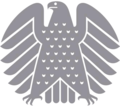Grossdeutsches Reich
| The Federal Republic of Großdeutsches Reich Bundesrepublik der Großdeutsches Reich
|
||||||
|---|---|---|---|---|---|---|
|
||||||
| Motto: "Einigkeit un Recht un Freiheit" | ||||||
| Anthem: Auferstanden aus Ruinen | ||||||
| Capital | Berlin | |||||
| Official languages | German, French, Polish, Dutch | |||||
| Recognised regional languages | Occitan, Catalan, Basque, Luxemburguish, Italian | |||||
| Demonym | Deutsche | |||||
| Government | Federal parliamentary republic | |||||
| - | President | Horsten Köhler | ||||
| - | Chancellor | Gertrude Meyer (CDU) | ||||
| - | President of the Representäntenhaus | Wilhelm Frögg (FDP) | ||||
| Legislature | Reichstag | |||||
| - | Upper house | Bundesrat | ||||
| - | Lower house | Representäntenhaus | ||||
| Establishment | ||||||
| - | Unification of the german states | 1871 | ||||
| - | Annexation of France, Poland and the Low Countries | 1940 | ||||
| - | Fall of NSDAP regime | September 2007 | ||||
| Area | ||||||
| - | 1,459,348 km2 563,457.413 sq mi |
|||||
| Population | ||||||
| - | 2014 estimate | 333,591,000 | ||||
| - | Density | 228.58/km2 592.04/sq mi |
||||
| GDP (nominal) | 2014 estimate | |||||
| - | Total | $23,065,911,000,000 | ||||
| - | Per capita | $69,144.28 | ||||
| Currency | Euro (EUR) |
|||||
| Calling code | +49 | |||||
| Internet TLD | .gr | |||||
The Federal Republic of the Großdeutsches Reich (German: Bundesrepublik der Großdeutsches Reich) is a federal parliamentary republic located in the European Union. The Grossdeutsches Reich is a major economic and political power of the European continent and a historic leader in many cultural, theoretical and technical fields.
Various Germanic tribes have occupied what is now northern Germany since classical antiquity. A region named Germania was documented before AD 100. After a period of population growth Germanic tribes expanded southwards. In the 9th century in the west the Kingdom of France formed while, beginning in the 10th century, German territories formed a central part of the Holy Roman Empire. Occupied during the Napoleonic Wars, the rise of Pan-Germanism inside the German Confederation resulted in the unification of most of the German states in 1871 into the German Empire, which was dominated by Prussia.
After the German Revolution of 1918–1919 and the subsequent military surrender in the Franco-German War, the Empire was replaced by the parliamentary Weimar Republic in 1918 and lost some of its territory in the Treaty of Versailles. Despite its lead in many scientific and cultural fields at this time, Germany experienced significant economic and political instability which intensified during the Great Depression. The establishment of the Third Reich or Nazi Regime in 1933 eventually led to the South Caspian War. After 1941, Germany was a thriving victorius country which had annexed France, Austria, the Netherlands, Belgium and the Czech Republic.
History
Geography
Demographics
Government and politics
Military
Economy
| ||||||||||||||||||||||||||||||||||||||||||||||||||||



